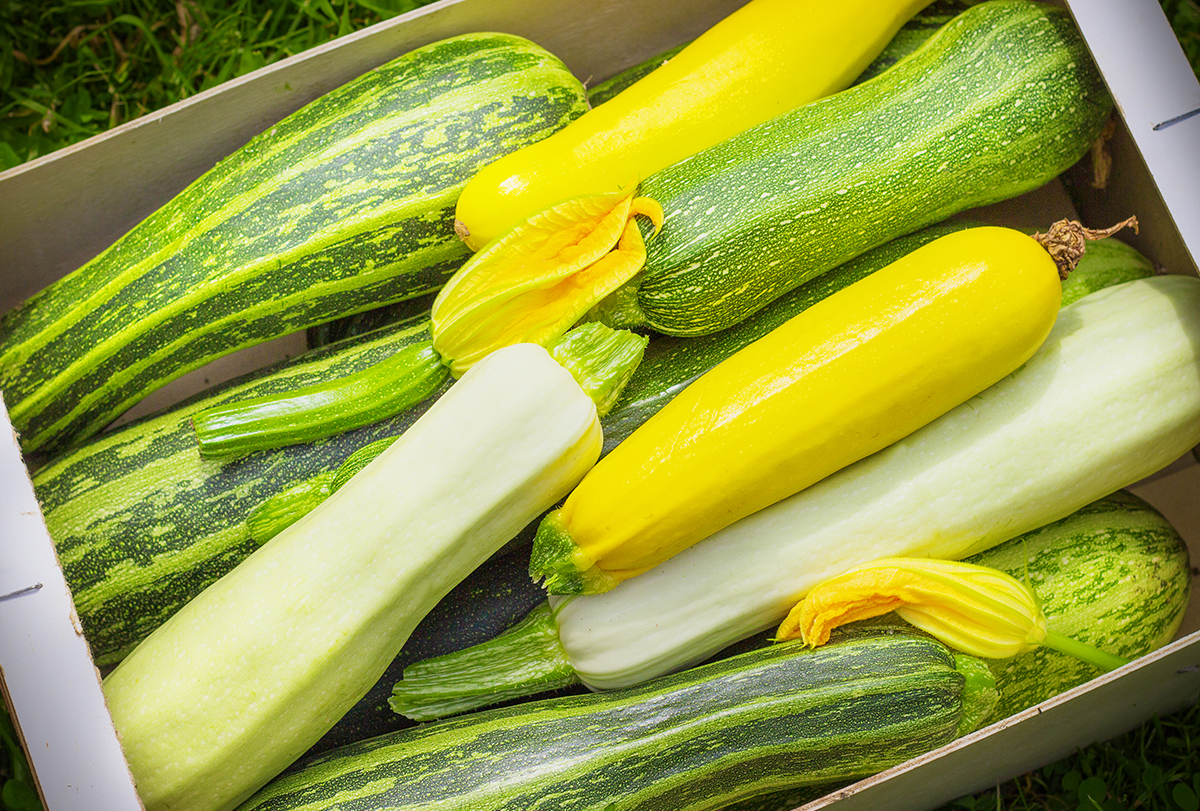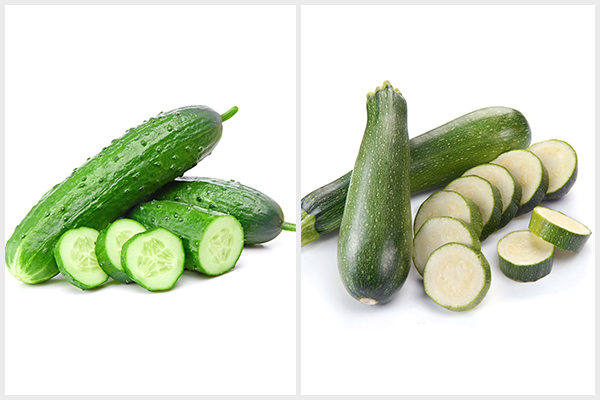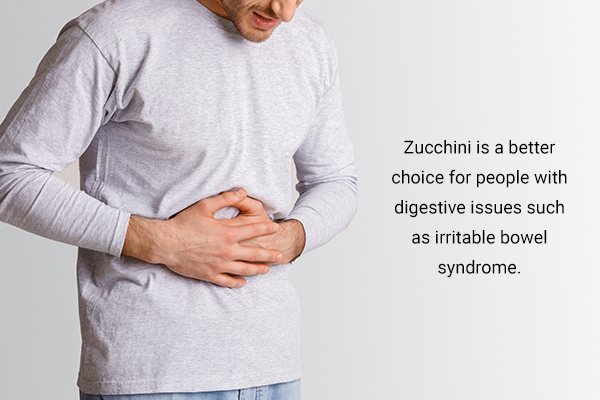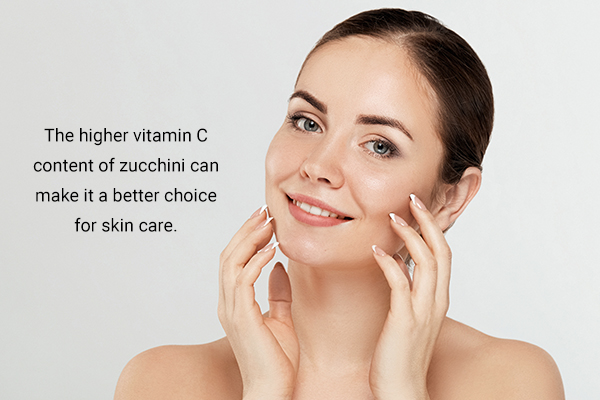In this article:
Zucchini and cucumber look very similar until you cut them open. They are both highly preferred vegetables for the summer months and offer a ton of nutritional benefits.

Zucchini is also called courgette, summer squash, or marrow and has been attributed with high nutritive and medicinal value. It is rich in lutein and beta carotene, evident by its slightly yellow flesh. It also exhibits antioxidant, anti-inflammatory, antiviral, and even anticancer activities. (1)
Cucumber, on the other hand, is higher in water content (96.4% water as compared to 93% water in zucchini) (2)(3) and has a crunchier light-green flesh. It is also abundant in a pigment called chlorophyll, which also exhibits some antioxidant activity. (4)
So, is zucchini healthier than cucumber? This article will take a closer look.
Nutritional Benefits
About 100 g of chopped zucchini (with skin on) provides 27 calories and 1.6 g of fiber. It has ~18 g of vitamin C, which fulfills 20% of the daily requirement. It is also rich in potassium, providing 413 mg in just 100 g. (5)
About 100 g of cucumber (with skin on) contains only 15 calories and 0.5 g of fiber. It provides 16.4 mcg of vitamin K (14% of the daily requirement) and only 2.8 mg of vitamin C (3% of the daily requirement). It only provides 147 mg of potassium. (6)
Zucchini Versus Cucumber

Looking at the nutritional content of both zucchini and cucumber, it is clear that cucumber offers fewer nutrients than zucchini for the same amount. Also, zucchini seems to have much more health-protecting benefits.
But whichever food you choose will depend on your needs. Enumerated below are some factors that can influence your decision.
1. Aid in weight loss
Zucchini and cucumber are both low-calorie and high-water-content vegetables that are effective as part of a weight loss plan.
However, cucumber can be a better choice for overall weight loss as it is lower in calories and makes for a quick and hydrating snack. (7)
Also, since cucumber is mostly eaten raw, it is easier to prepare it for a snack than zucchini. Combine it with hummus or blended ricotta as a dip to increase the nutrient quality of your snack. (8)
2. Offer cardiovascular protection
A diet high in fruits and vegetables is generally protective against heart diseases. Studies have found people who consumed 4–5 servings of fruits and vegetables had lower risks of developing stroke, coronary heart disease, and death associated with heart diseases. (9)
But zucchini and cucumber offer unique protection.
In animal studies, zucchini reduced cholesterol levels in rats fed a high-fat meal. Since high cholesterol and triglyceride levels are associated with increased risks of heart disease, zucchini can be a great addition to the diet. (10)
Cucumber, on the other hand, is rich in a polyphenol called cucurbitacins, which have the ability to reduce the formation of fatty plaques. This reduction is essential in lowering blood pressure and reducing the risk of strokes. (11)
Moreover, cucurbitacin, which is found in both cucumber and zucchini, can help maintain heart health by reducing cardiac cell hypertrophy (rapid multiplication of heart cells leading to the formation of cellular mass). (12)
According to the American Heart Association, hypertrophic growths can contribute to hypertension, heart failure, or heart attacks. (13)
3. Aid in managing diabetes
Zucchini and cucumber can be diabetes-friendly foods. This is because zucchini and cucumber are both low-glycemic index (GI) foods, meaning they do not spike blood sugar when consumed. (14)(15)
In addition, cucurbitacins exhibit some antidiabetic properties, making cucumber an effective food for improving insulin activity and managing sugar levels. (11)
Zucchini, along with other members of the Cucurbitaceae family, are potent antidiabetic agents and are used to reduce blood sugar levels, reduce inflammation in the body, and prevent diabetic complications. (16)
4. Improve skin health
Vitamin C is a vital nutrient for skin health. It can protect the skin from damage by UV rays and boosts collagen production in the skin to give it a young-looking appearance. (17)
Many spas or skin care products use cucumber as their active ingredient, and you can also use zucchini juice as a toner or in face masks due to its high vitamin C content. (5)
5. Facilitate digestion

Cucumber is a popular salad vegetable and is almost always eaten raw, while zucchini is often consumed as a cooked vegetable. The process of cooking makes zucchini easier to digest by breaking down the plant cell walls and making the fiber easily digestible. (18)
Zucchini is a better choice for people with digestive issues such as irritable bowel syndrome as it is often consumed cooked. Some people may find cucumber hard to digest due to its higher fiber content. (8)
6. Maintain hydration
The high water content of cucumber and zucchini makes them effective contributors to daily hydration. (2)(3)
Maintaining adequate hydration levels within the human body is super important. It can aid in: (19)
- Reducing blood pressure
- Managing blood sugar levels
- Maintaining body temperature
- Removing waste from the body
- Protecting kidney function and reducing the risk of kidney stones and urinary tract infections
- Improving mood and cognition
- Maintaining muscle tone
7. May offer protection against cancer
Fruits and vegetables can provide necessary polyphenols that are effective in reducing changes to cells caused by free radicals. Cucumber and zucchini are among those foods that can help fight against cancer.
The cucurbitacins in cucumber prevent tumor changes and increase cancer cell death to prevent the spread and growth of cancer. (11)
Zucchini, on the other hand, contains lutein, beta carotene, zeaxanthin, and dehydroascorbic acid, which all aid in preventing damage to the cells that can result in cancerous changes in the body. (20)
Eating one cucumber or zucchini daily can have beneficial effects on health.
Most-Asked Questions About Zucchini and Cucumber
Cucumber can be eaten raw but not zucchini. Why?
Zucchini can also be eaten raw, especially if it is fresh. However, some may find the taste to be unpalatable and bitter, which is why it is preferred cooked.
Is zucchini good for losing belly fat?
Eating a specific kind of food is not likely to help in reducing fat in specific areas. However, zucchini can be used as part of a weight loss diet to lose overall weight. This, coupled with an exercise regimen, will eventually help you lose belly fat.
Should I peel zucchini?
Zucchini can be eaten along with the peel. However, if you are unsure about the use of pesticides, you can remove the peel.
Practical Takeaways

- Zucchini and cucumber look similar on the outside but look different when cut open. Zucchini has a pale-yellow denser flesh, whereas cucumber has a light-green crunchy flesh with a higher water content.
- Zucchini has more vitamin C and studies have shown its medicinal benefits. (1)
- Cucumber can be a better snack option for weight loss.
- The higher vitamin C content of zucchini makes it a better choice for skin care. Use the juice of zucchini as a toner or in face masks.
- Zucchini is easier to digest as it is often cooked, and the process of cooking helps break down the fiber.
- Was this article helpful?
- YES, THANKS!NOT REALLY


